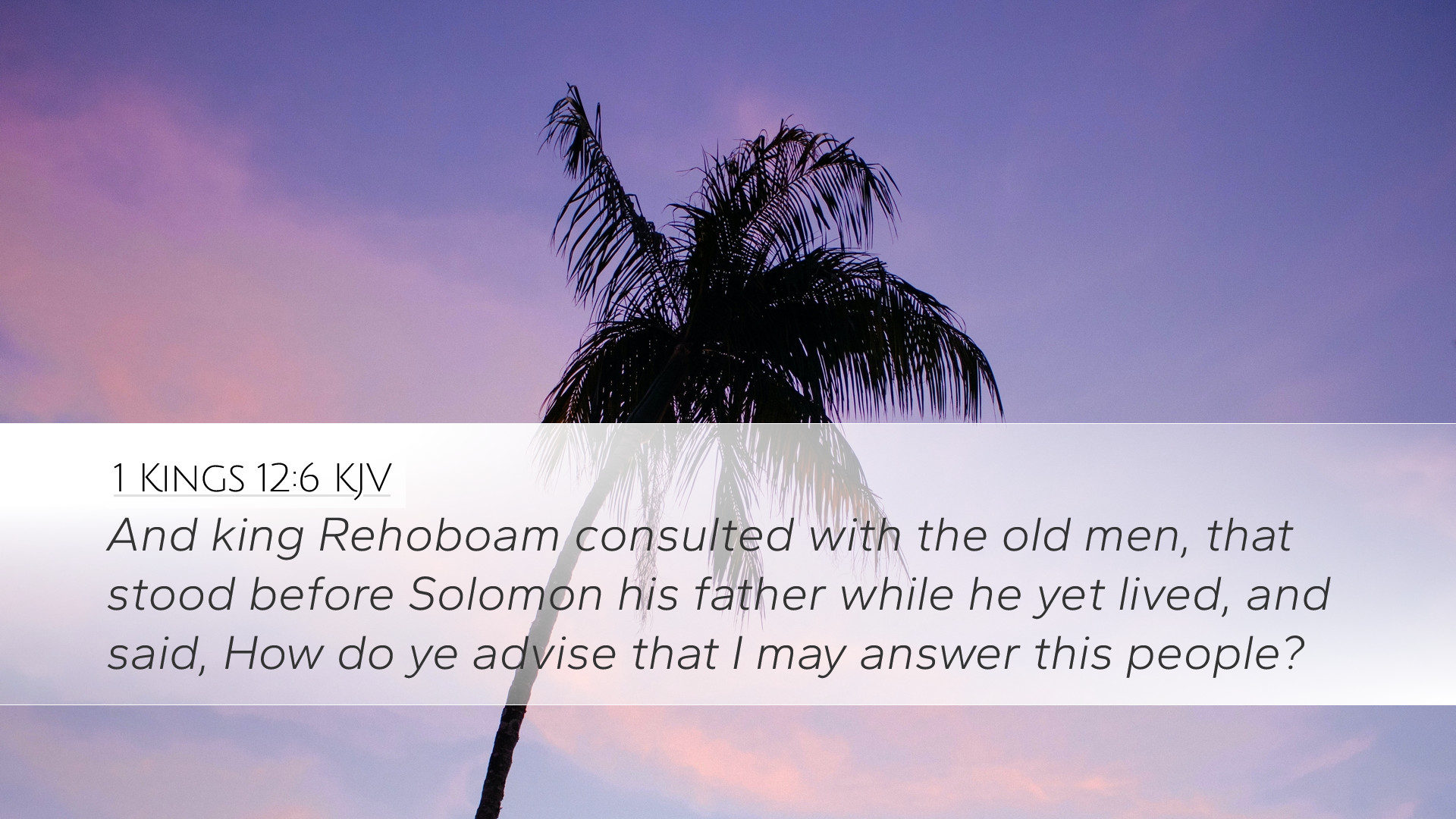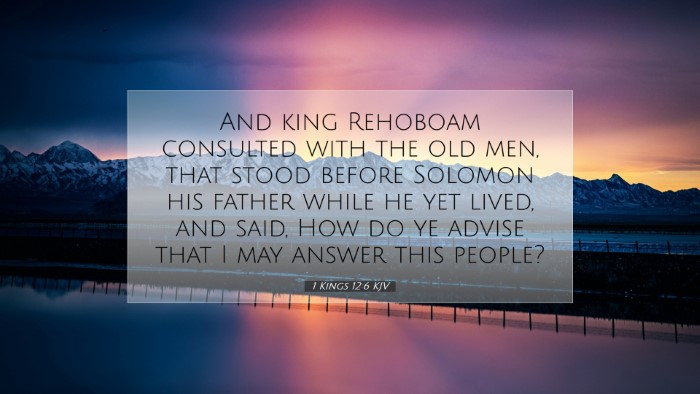Commentary on 1 Kings 12:6
This verse presents a critical moment in the history of Israel, marking the transition from a united monarchy under Solomon to a divided kingdom. The context of this verse involves King Rehoboam seeking counsel concerning how to govern the people of Israel after the death of his father, Solomon.
Contextual Background
In 1 Kings, chapter 12, the kingdom of Israel faces a crisis of leadership. Following the death of Solomon, Rehoboam ascends to the throne. The tribes of Israel, feeling burdened by the taxes and labor imposed during Solomon's reign, approach Rehoboam with a request for relief. This moment is pivotal, as it sets the stage for the eventual division between the northern and southern kingdoms.
Analysis of 1 Kings 12:6
“And King Rehoboam consulted with the old men, that stood before Solomon his father while he yet lived, and said, How do ye advise that I may answer this people?”
Counsel of the Elders
Rehoboam seeks the advice of the older, experienced leaders who had served under his father Solomon. There are several insights drawn from the commentaries regarding this consultation:
-
Matthew Henry notes that by consulting the elders, Rehoboam initially demonstrates wisdom, as he is seeking guidance from those with experience. However, it also reflects his insecurity as a new ruler, highlighting the common need for counsel among leaders.
-
Albert Barnes emphasizes that these elders had lived through the years of labor and tribulation under Solomon. Their perspective would have been more informed by the reality of the people's burdens than by the naivety of youth. Barnes points out that their advice was rooted in a desire for peace and unity.
-
Adam Clarke points out that the elders advised Rehoboam to be a servant to the people and to lighten their burdens. Their counsel stressed the importance of humility in leadership, stating that the response to the people's request would determine Rehoboam's legacy.
Implications of Leadership Decisions
The decision-making process Rehoboam undergoes is critical. His choice to consult with elders reflects the biblical principle of seeking wise counsel:
-
The value of wisdom and experience in leadership decisions cannot be overstated, echoing Proverbs 15:22: "Without counsel plans fail, but with many advisers, they succeed."
-
Leaders are often faced with choices that have long-lasting impacts on their communities, which requires discernment and humility.
Contrast with Younger Counselors
Rehoboam eventually seeks advice from the younger counselors who had grown up with him. This decision reflects the tension between youthful impulsiveness and the seasoned wisdom of age:
-
According to Henry, the younger advisors advocate for a harsher approach, encouraging Rehoboam to assert his authority. This stark contrast in counsel serves as a warning about the dangers of ignoring seasoned advice.
-
Barnes indicates that the appeal to youthful pride leads Rehoboam to reject the elders' advice, resulting in immediate consequences that fracture the kingdom.
-
Clarke argues that the choice of counsel ultimately reveals the character of Rehoboam—he opts for the path of arrogance over humility, signaling a critical misstep in his leadership.
Lessons for Leadership Today
This passage offers several important lessons for contemporary leaders:
-
The importance of humility and servanthood in leadership. Rehoboam's failure to heed wise counsel leads to division, illustrating how leaders must prioritize the needs of the people over personal ambition.
-
The value of listening to and incorporating advice from those who are experienced. Effective leaders cultivate a diverse group of counselors, integrating perspectives from different generations.
-
The consequences of decisions made in pride. Leaders must be cautious of their impulses and avoid the traps of arrogance, ensuring they remain focused on their responsibilities to their constituents.
Conclusion
1 Kings 12:6 serves as a crucial reminder of the complexities of leadership and the impact of decisions made by those in authority. The divergent paths chosen by Rehoboam based on the counsel of either the elders or the youth demonstrate the necessity of wisdom in leadership. By reflecting on both the historical context and the theological implications of this scripture, pastors, students, theologians, and scholars can draw valuable insights into the nature of godly leadership and the importance of community in decision-making.


